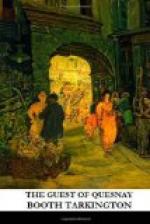The valet-de-chambre whom my fellow-lodgers had brought with them from Paris contributed nothing to the inn’s knowledge of his masters, I learned. This struck me not only as odd, but unique, for French servants tell one another everything, and more—very much more. “But this is a silent man,” said Amedee impressively. “Oh! very silent! He shakes his head wisely, yet he will not open his mouth. However, that may be because”—and now the explanation came—“because he was engaged only last week and knows nothing. Also, he is but temporary; he returns to Paris soon and Glouglou is to serve them.”
I ascertained that although “that other monsieur” had gray hair, he was by no means a person of great age; indeed, Glouglou, who had seen him oftener than any other of the staff, maintained that he was quite young. Amedee’s own opportunities for observation had been limited. Every afternoon the two gentlemen went for a walk; but they always came down from the gallery so quickly, he declared, and, leaving the inn by a rear entrance, plunged so hastily into the nearest by-path leading to the forest, that he caught little more than glimpses of them. They returned after an hour or so, entering the inn with the same appearance of haste to be out of sight, the professor always talking, “with the manner of an orator, but in English.” Nevertheless, Amedee remarked, it was certain that Professor Keredec’s friend was neither an American nor an Englishman. “Why is it certain?” I asked.
“Monsieur, he drinks nothing but water, he does not smoke, and Glouglou says he speaks very pure French.”
“Glouglou is an authority who resolves the difficulty. ’That other monsieur’ is a Frenchman.”
“But, monsieur, he is smooth-shaven.”
“Perhaps he has been a maitre d’hotel.”
“Eh! I wish one that I know could hope to dress as well when he retires! Besides, Glouglou says that other monsieur eats his soup silently.”
“I can find no flaw in the deduction,” I said, rising to go to bed. “We must leave it there for to-night.”
The next evening Amedee allowed me to perceive that he was concealing something under his arm as he stoked the coffee-machine, and upon my asking what it was, he glanced round the courtyard with histrionic slyness, placed the object on the table beside my cap, and stepped back to watch the impression, his manner that of one who declaims: “At last the missing papers are before you!”
“What is that?” I said.
“It is a book.”
“I am persuaded by your candour, Amedee, as well as by the general appearance of this article,” I returned as I picked it up, “that you are speaking the truth. But why do you bring it to me?”
“Monsieur,” he replied, in the tones of an old conspirator, “this afternoon the professor and that other monsieur went as usual to walk in the forest.” He bent over me, pretending to be busy with the coffee-machine, and lowering his voice to a hoarse whisper. “When they returned, this book fell from the pocket of that other monsieur’s coat as he ascended the stair, and he did not notice. Later I shall return it by Glouglou, but I thought it wise that monsieur should see it for himself.”




